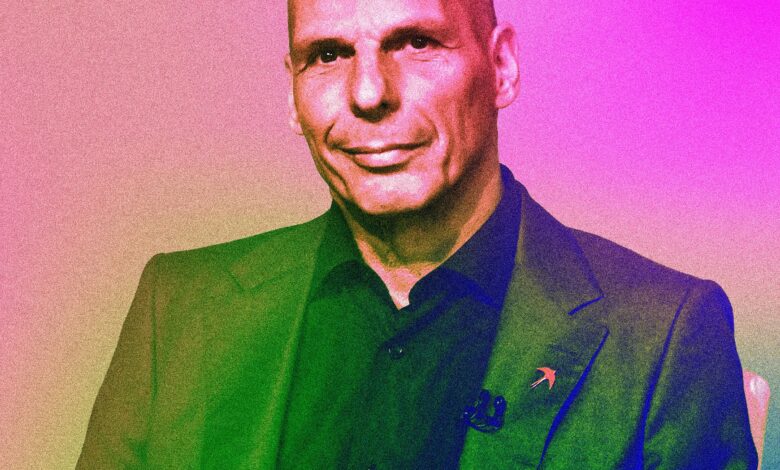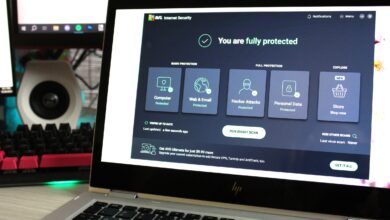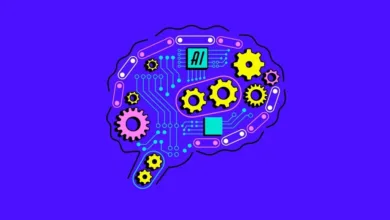Welcome to the Age of Technofeudalism

The tech giants have overthrown capitalism. That’s the argument of former Greek finance minister Yanis Varoufakis, who became famous trying to defend debt-laden Greece from its German creditors. Varoufakis has never quite regained the notoriety of 2015. But he has remained a prominent left-wing voice. After a failed campaign for a seat in the European Parliament in 2019, he plans to run again this June. This time, his adversary isn’t Berlin or the banks. It’s the tech companies he accuses of warping the economy while turning people against one other.
Courtesy of Penguin Random House
Varoufakis is also a prolific author; his 17th book, written as a letter to his techno-curious father, chronicles the evolution of capitalism from the 1960s advertising boom, through Wall Street in the 1980s, to the 2008 financial crisis and the pandemic. In its most compelling stretches, Technofeudalism argues that Apple, Facebook, and Amazon have changed the economy so much that it now resembles Europe’s medieval feudal system. The tech giants are the lords, while everyone else is a peasant, working their land for not much in return.
To Varoufakis, every time you post on X, formerly Twitter, you’re essentially toiling Elon Musk’s estate like a medieval serf. Musk doesn’t pay you. But your free labor pays him, in a sense, by increasing the value of his company. On X, the more active users there are, the more people can be shown advertising or sold subscriptions. On Google Maps, he argues, users improve the product—alerting the system to traffic jams on their route.
The feudal comparison isn’t novel. But Technofeudalism attempts to introduce the idea to a wider audience. Its US release, launched the month before regulators in the US and European Union simultaneously initiated antitrust actions against Apple, also had impeccable timing.
Over Zoom, I spoke to Varoufakis, from his home near Athens, about how the tech giants have changed the economy—and why we should care about it.
This interview has been edited for length and clarity.
WIRED: That word, technofeudalism, what does it mean? How is the feudal system relevant here?
Yanis Varoufakis: Profit drives capitalism, rent drove feudalism. Now we have moved [from one system to the other] because of this new form of super-duper, all-singing, all-dancing capital: cloud capital, algorithmic capital. If I’m right, that is creating new digital fiefdoms like Amazon.com, like Airbnb, where the main mode of wealth extraction comes in the form not of profit but of rent.
Take the Apple Store. You are producing an app, Apple can withhold 30 percent of your profits [through a commission fee]. That’s a rent. That’s like a ground rent. It’s a bit like the Apple Store is a fiefdom. It’s a cloud fiefdom, and Apple extracts a rent exactly as in feudalism. So my argument is not that we went back from capitalism to feudalism. My argument is that we have progressed forward to a new system, which has many of the characteristics of feudalism, but it is one step ahead of capitalism. To signal that, I added the word techno.
When you’re talking about these digital fiefdoms, the idea is easier to understand in terms of platforms that take a cut of the sales, like the Apple App Store or Amazon. But can you also accuse other platforms of operating these digital fiefs, like Facebook?
Facebook is a classic cloud fief. It creates cloud capital which is attractive to you, to me, to other people who want to communicate with each other—to find friends, or post their views, or news about their dog or their cat. So you’re drawn into this fiefdom, and then the next step for Zuckerberg was to draw into the same fiefdom publishers and advertisers in order to sell them the attention of users. And then immediately after that, as Cory Doctorow so beautifully describes through his concept of enshittification, you’re a publisher, you feel great because your sales go up through Facebook, and then suddenly, you find that you’ve been downgraded. And then you have to pay a higher cloud rent in order to be re-upgraded [paying for ads, for example, for customers to find your product]. That’s typical cloud capitalism, producing technofeudalism.
I understand technofeudalism as affecting three groups of people. Can we boil down who is affected into these groups?
Yes, and I’ve given them names. The company that produces the electric bicycles sold on Alibaba or Amazon.com, this is a vassal capitalist. Most of the profit margin for that company is skimmed off by Jeff Bezos [Amazon’s founder and executive chairman] in the form of cloud rent.
Second is cloud proles, or cloud proletarians. Look at the workers in Amazon warehouses who are monitored by algorithms.
And the third one is you and me. I call us cloud serfs. Because the parallel with the serfs is that we volunteer free labor. It doesn’t matter whether we’re enjoying it or not. Every time you upload a video on Tiktok, on Facebook, on Instagram, you’re adding to the capital stock of these companies. We are adding to it directly through our labor or our movement or our existence. In that way we’re serfs, but we are more than serfs, we’re cloud serfs producing capital. And that has never happened in the history of the world.
A company like Apple might argue that instead of being a fiefdom, maybe the Apple App Store is more like a mall where companies have to rent their stores from whomever owns the building. How is technofeudalism different from the mall dynamic?
Well, hugely. Say you and I were going into partnership together with a fashion brand. We go to the shopping mall and we hire a shop, the rent is fixed. It is not proportional to our sales. The more money we make, the higher our price-to-rent margin. With the Apple Store, they get 30 percent of all sales. That’s not at all the same thing. That is the equivalent of the ground rent that the feudal lord used to extract from vassal capitalists.
What makes cloud capitalism a worse economic system than capitalism?
The first thing is from a macroeconomic perspective. When you have such a large sum of money extracted in the form of cloud rent, that money disappears from a circular flow of income. According to my calculations, between 35 and 40 percent of GDP is being siphoned off the circular flow of income by cloud rent, and that means there is less money in the economy. Investment is low, and that means less good, quality jobs in the rest of the economy.
The second reason is that this cloud capital is designed to reproduce itself through our attention and through our free labor. And platforms discovered that we spend more time doing this, producing free cloud capital for the owners of cloud capital, if we’re angry. So algorithms are primed to poison our conversations. That is highly detrimental to our democracies because consensus is really bad for cloud capital. It doesn’t want it. It wants you and me to be angry and shouting at each other.
Now, as a professor, I have noticed the effect on kids in universities in Britain, in Australia, here in Greece, in America. I find that students today are too scared of having a face-to-face conversation. They want a safe space. They do not want any challenging ideas to be presented to them in class. They protest, they will have you thrown out of university if you say something that upsets them, about anything. But give them a phone and they become toxic and ballistic. Now, that is no way of running a democracy or a civilized society for that matter.
People have already expressed dissatisfaction with capitalism in various protest movements across Europe. Why should they care that there’s been a shift to a slightly different system that’s dominated by a slightly different kind of company?
Ordinary people need to know the reasons behind the discontent. The discontented always ask: Why is this happening? Giving them an answer, in a way that makes sense to them, is hugely empowering. This is the foundation of any possibility of democracy. Because to have democracy, it’s not enough to be able to vote every four or five years. You need people who understand what is going on, who are informed about the causes of their discontent. Because if they don’t understand the causes of their discontent, then it’s easy for them to fall prey to xenophobia, to misogyny, to racism. Then they can say, it’s the Jew. It’s the Muslim. It’s the foreigner. It’s the Brit. It’s the German, whatever. Then people latch on to simple solutions, which is the beginning of fascism.
Are we at the beginning of fascism? And if so, is that really technofeudalism’s fault?
I think that fascism is already on the rise. In France almost 45 percent of the population are supporting a neofascist [Marine Le Pen]. In Italy, we have a neofascist prime minister, Giorgia Meloni. That was not the doing of technofeudalism, because technofeudalism came later. What happened is, the rise of cloud capital and the siphoning off of money from the circular flow of income increases the discontent within people. At the same time you have the algorithms which make money and accumulate cloud capital to the extent that we hate one another. Hate is the fuel of facism. So if you blend discontent, the fact that most people can’t make ends meet, and you throw in there the hatred that is reinforced by the algorithms, that’s fascism.
So if we have this new system that is fueling a new fascism, then what should we do about it?
Well, many things. But to begin with, let’s understand where we are, so we don’t blame the foreigners. We don’t blame women. We don’t blame trans people. A little bit of knowledge goes a long way towards recreating the circumstances for a decent conversation between us.
In economic terms, we need to introduce a cloud tax immediately. Tax Amazon 5 percent for every transaction that takes place on its platform. Then, introduce a capacity for you and me to own a digital identity so we don’t need Google or Facebook to vouch for who we are on the internet. Having a state-issued digital identity will go a long way towards restoring or handing you property rights over your data, because at the moment you do not own your data.
You can introduce interoperability. I am on X. I can’t go to Bluesky. Let’s say that Elon Musk decides to block me because I said something he didn’t like. He has blocked me before for a couple of weeks. Now, I have more than a million followers on X. I cannot leave without losing them. If I go to Bluesky, I have 10 followers. Interoperability would mean that if I go to another platform, to Bluesky, when I post something on Bluesky, then my 1 million followers on X can hear it.
It’s interesting you mention interoperability, because that’s one of the proposals in the EU’s Digital Markets Act, which feels like it’s at least trying to get at some of the problems you’ve outlined. Do you think it goes far enough?
No, it certainly doesn’t go far enough. There are some interesting ideas in there, like interoperability. But nobody in government is actually working on this. This is my problem. Not that it is a hard task, but there is nobody working on it, because they don’t care. They are all in the pockets of the big technofeudal lords, as I call them.
So if you believe no one in government is doing anything, how do you move forward from that?
That’s a very good question. I have no idea. But this is why—against my spirit, against my preferences and my desires—I’m still in politics, because there is no alternative to politics.



